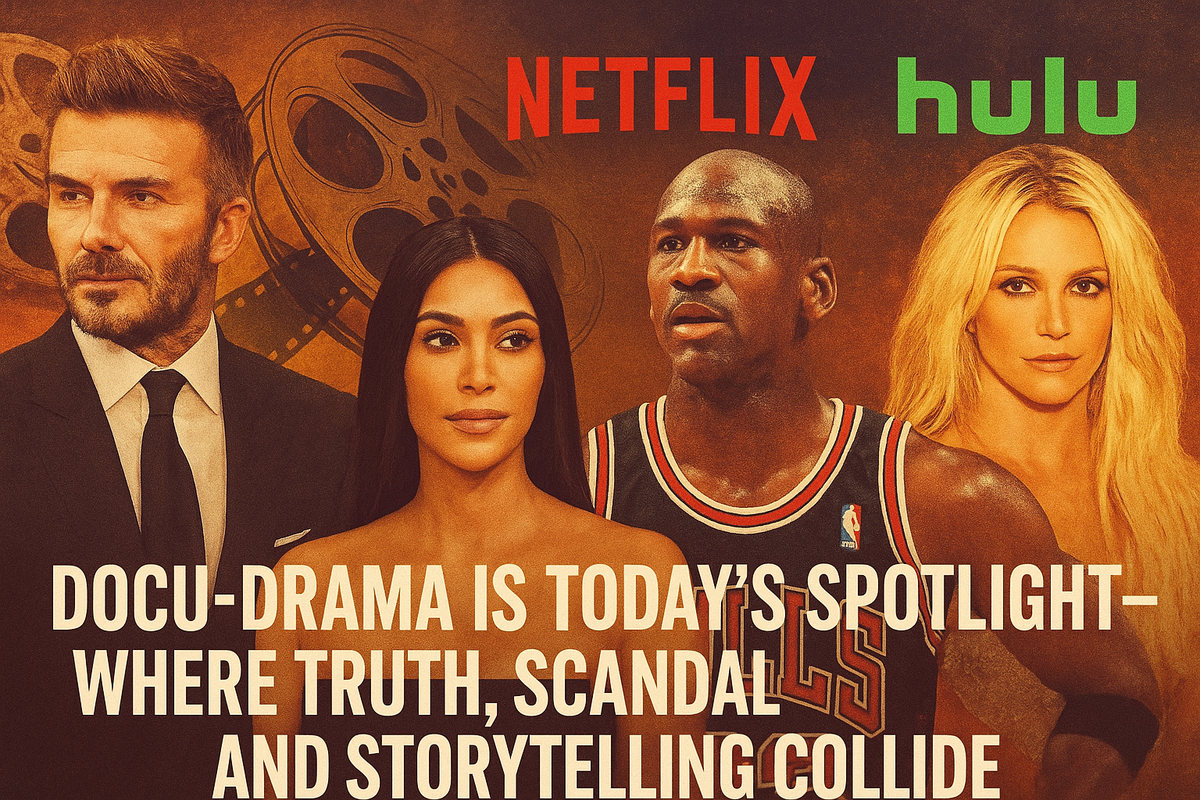The Rise of Docu-Drama: Why We Love Watching Celebs Get Exposed
From Beckham to Kardashians, docu-dramas dominate streaming. These celebrity exposés mix truth and spectacle, feeding our obsession with scandal, intimacy, and control. Here’s why the world can’t stop watching celebs get exposed.

Introduction: When Real Life Becomes the Script
In 2025, it’s clear: we don’t just want entertainment we want truth wrapped in drama. Streaming platforms like Netflix, Hulu, and Disney+ are flooded with a new wave of docu-dramas documentary-style series that blur the line between fact and spectacle. From Beckham and The Last Dance to Kardashian spin-offs and scandal-driven celebrity exposes, audiences are glued to shows that promise access, authenticity, and controversy.
But why does watching celebrities get exposed captivate us more than scripted Hollywood blockbusters? Why do we crave these unfiltered glimpses into the lives of the rich, famous, and flawed?
This blog breaks down the rise of docu-drama, exploring its history, psychology, economics, and cultural impact and why “truth TV” might be the entertainment format that defines our era.
From Reality TV to “Reality Plus”
The roots of docu-drama trace back to the boom of reality television in the 2000s. Shows like Keeping Up With the Kardashians and The Osbournes gave audiences access to celebrity homes, drama, and dysfunction. Yet, there was always a suspicion: much of it was staged.

Enter docu-drama where real archival footage, interviews, and behind-the-scenes material mix with stylized editing, dramatic scoring, and narrative arcs. Unlike reality TV, docu-dramas carry the sheen of authenticity, marketed as “the truth, finally revealed.”
- Beckham (Netflix, 2023) drew millions by revisiting David Beckham’s career highs and lows juxtaposing his sports triumphs with tabloid scandals.
- Pam & Tommy blurred the lines further, mixing dramatized acting with documentary-style truth-telling about the infamous stolen sex tape.
- The Kardashians reinvented their own narrative through polished docu-drama spin-offs on Hulu, reclaiming the stories tabloids once controlled.
Audiences know they’re being fed curated truth, yet the illusion of access is irresistible.
Why Docu-Dramas Hook Us
1. The Promise of “Behind the Curtain”
Celebrities seem untouchable, but docu-dramas offer the fantasy of peeking behind closed doors. We don’t just see David Beckham the athlete we see Beckham the father, husband, and flawed human. This peeling-back effect satisfies a primal curiosity: what are they really like?
2. Scandal Sells
No docu-drama is complete without scandal. From Tiger Woods’ downfall to Britney Spears’ conservatorship, these shows thrive on the tension between public image and private chaos. Viewers tune in to watch icons stumble, not just shine.
3. Parasocial Intimacy
Audiences develop one-sided relationships with stars, known as parasocial bonds. Docu-dramas deepen this connection, letting fans feel like confidants rather than consumers. When Beckham talks about hate mail or Kim Kardashian cries on camera, viewers feel personally involved.

4. The Meme Economy
Docu-dramas don’t just live on streaming they explode across social media. Whether it’s Jordan’s smirk in The Last Dance or Meghan Markle’s revelations in Harry & Meghan, viral clips fuel global conversations and memes. Watching becomes participation.
Beckham, Kardashians, and the Modern Blueprint
Beckham: Sports Meets Soap Opera
The Netflix hit Beckham wasn’t just about soccer it was about marriage rumors, mental health, and the cruelty of British tabloids. It humanized an icon while also feeding the audience’s appetite for gossip.
The Kardashians: Controlling the Narrative
For years, tabloids controlled the Kardashian-Jenner storyline. Now, through Hulu’s docu-drama-style spin-offs, they control their own image. Each episode is a PR masterclass, mixing vulnerability with brand promotion.
Harry & Meghan: Royalty Meets Reality
Perhaps the clearest example of docu-drama power, Netflix’s Harry & Meghan shattered the monarchy’s carefully crafted image. Half confession, half cinematic spectacle, it showed how docu-drama can be both cultural commentary and personal weapon.
The Business of Docu-Drama
Streaming Gold
Streaming platforms are in a content war, and docu-dramas are cheap compared to scripted series. They use archival footage, limited sets, and often have stars willing to participate for exposure.
Global Appeal
Unlike sitcoms or sports, docu-dramas travel easily across cultures. Everyone understands scandal, heartbreak, and family drama. That’s why shows like Beckham and The Last Dance broke global viewership records.

Celebrity Bargains
For celebrities, docu-dramas double as reputation rehab. Beckham softened his tabloid image, the Kardashians rebranded as business moguls, and Britney Spears’ documentaries reframed her as a victim rather than a punchline. It’s exposure with a narrative twist: they get to tell their side.
The Blurred Line: Documentary or Drama?
Critics argue docu-dramas aren’t pure documentaries they’re carefully edited narratives with agenda-driven storytelling. Directors control what’s shown, what’s cut, and how it’s framed.
Take The Last Dance: while it gave unprecedented access to Michael Jordan, it was also produced with Jordan’s involvement, leading some to call it “a 10-hour commercial for MJ.”
This blurred line is part of the intrigue: we know we’re being manipulated, but we watch anyway.
The Psychology: Why We Crave Exposure
Schadenfreude & Relatability
There’s comfort in seeing the mighty fall. Watching celebrities struggle with cheating scandals, career failures, or breakdowns makes them feel less untouchable. It’s schadenfreude mixed with relatability.
The Illusion of Justice
Tabloids exploited stars for decades. Now, docu-dramas claim to “set the record straight.” Viewers enjoy the sense of justice seeing celebrities reclaim their narratives or expose hidden truths.
Escapism with Reality Anchors
Traditional dramas are escapist but fictional. Docu-dramas offer escapism with the added thrill of this actually happened. It’s gossip elevated to art form.
Case Studies: Iconic Docu-Dramas
- The Last Dance (2020): Showed the hunger for sports stories told as dramatic sagas.
- Framing Britney Spears (2021): Sparked real-world change by fueling the #FreeBritney movement.
- Beckham (2023): Mixed nostalgia, scandal, and humanization, redefining sports docu-drama.
- Kardashians (Ongoing): Proof that stars can outmaneuver tabloids by narrating their own drama.
- Tiger (2021, HBO): Demonstrated that even fallen heroes can be resurrected through docu-drama.
The Dark Side of Celebrity Exposure
1. Exploitation Disguised as Empathy
Docu-dramas claim to humanize, but they also exploit pain for profit. Britney Spears’ trauma became a ratings boom.
2. Manufactured Vulnerability
Not all “truth” is unfiltered. Stars curate what they want audiences to see, mixing tears with branding. The risk: authentic suffering becomes another form of entertainment.
3. Audience Fatigue
With so many exposés, viewers may become numb or worse, demand increasingly extreme scandals. The hunger for exposure could push boundaries into unethical territory.
The Future of Docu-Drama
- AI-driven storytelling: Personalized docu-dramas where viewers choose which “truth” to explore.
- Interactive formats: Live Q&A or behind-the-scenes drops during releases.
- Crossover genres: Hybrid docu-dramas blending fictional reenactments with real footage (Pam & Tommy style).
Corporate docu-dramas: Expect brands and politicians to use the format for their own narratives.

As the lines blur between journalism, entertainment, and PR, docu-dramas may become the dominant storytelling tool of the digital era.
Conclusion: Why Truth Sells Better Than Fiction
The rise of docu-drama proves a cultural truth: we’re obsessed with exposure. Celebrities once built empires on mystique now they build them on vulnerability, curated access, and carefully crafted chaos.
From Beckham’s scandals to Kardashian spin-offs, we don’t just want to watch stars we want to watch them get stripped of perfection. And whether that truth is raw or manufactured, one thing is clear: in today’s entertainment economy, nothing sells better than the illusion of honesty.




